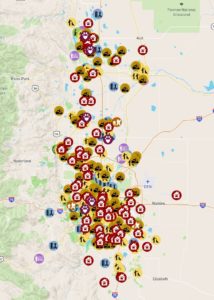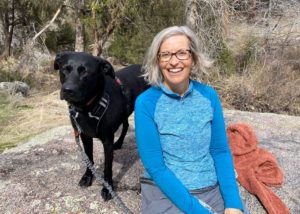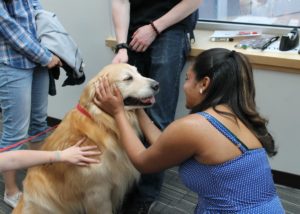
Individuals with cancer often develop strong bonds with their pets, deriving support from the love that their animals provide.
When conducting research on how the human-animal bond affects breast cancer survivors, Colorado State University faculty members Jennifer Currin-McCulloch, assistant professor in the School of Social Work, and Lori Kogan, professor in the Department of Clinical Sciences, discovered survivors are often worried about their pet’s wellbeing while they undergo treatment and recovery.
Fighting cancer often drains individuals of their energy and strength, reducing their ability to fully take care of their pet.
Their solution to this challenge is the Pet Services Guide, a user-friendly, free to use, online map of resources and locations dedicated to taking care of animals, covering everything from grooming to low-cost veterinary care.
The map spans from the Denver Metro area up to the Wyoming border.
“Our grant was a Colorado-based project between the University of Colorado and CSU. We had two amazing students call over 900 different organizations that provide pet care services, trying to think of what kind of care folks would need when they’re diagnosed to make sure their pets were supported,” said Currin-McCulloch.
The two students involved, Amelia Malone from CSU and Savannah Schwab from CU, made sure that every opportunity for those with a cancer diagnosis to get help was met and recognized. Malone also went to all the dog parks in the region and interviewed people to find out what they had done when they had surgery or a health crisis.
First of its kind
“Hundreds of people said no one has asked them about their ability to take care of their animals,” said McCulloch.

“People talk a lot about the benefits of pets when someone is going through a hard time, but that only tells part of the story,” said Kogan. “The other side is that there are challenges associated with pet ownership, especially for people who are going through some type of crisis. We’re really good at saying how wonderful the pets are, but we’re not very good at supporting people when they need some extra help with their pets, or identifying what those needs even are.”
The implementation of this Pet Services Guide is the first of its kind, working to alleviate guilt the owner may feel.
“There was a significant amount of guilt in their responses and wanting to spend more time with their pets,” said Currin-McCulloch. “They want to be able to be as good as they had been at caring for their animals before their illness.”
Resounding impact
“Through our study, we found that pets are incredible sources of support. Sometimes, people who are diagnosed are not up for conversations with people or looking presentable. Pets don’t care about either one of those things,” said Kogan.

The love and comfort derived from human-animal bonds are profound, especially during moments of crisis, like a cancer diagnosis.
Users of the tool have already reported how much it has helped them while they were undergoing treatment.
“During breast cancer treatment, my dogs provided critical support as I recovered from surgery and survived the effects of chemotherapy,” said Naomi, a user of the tool. “Having a centralized place to look for the support I needed for them was so valuable. Whether it was a dog walker to help getting my dogs exercise, or a groomer close to home, having an easy way to get help for my pets helped ease my mind.”
Kogan hopes this tool will improve the physical and mental health of people undergoing treatment.
“When people are feeling guilty, worried, and stressed about their pets, it impacts their physical and mental health. We want to provide resources so they feel like they are doing all they can and make it easier for them,” said Kogan.
“It’s great to be able to give something back to the community and say, based upon our research, here’s a resource that might be helpful to people,” said Kogan. “Our hope is that when word gets out, friends and family will talk about how useful and easy to use it is.”
The School of Social Work is part of CSU’s College of Health and Human Sciences.